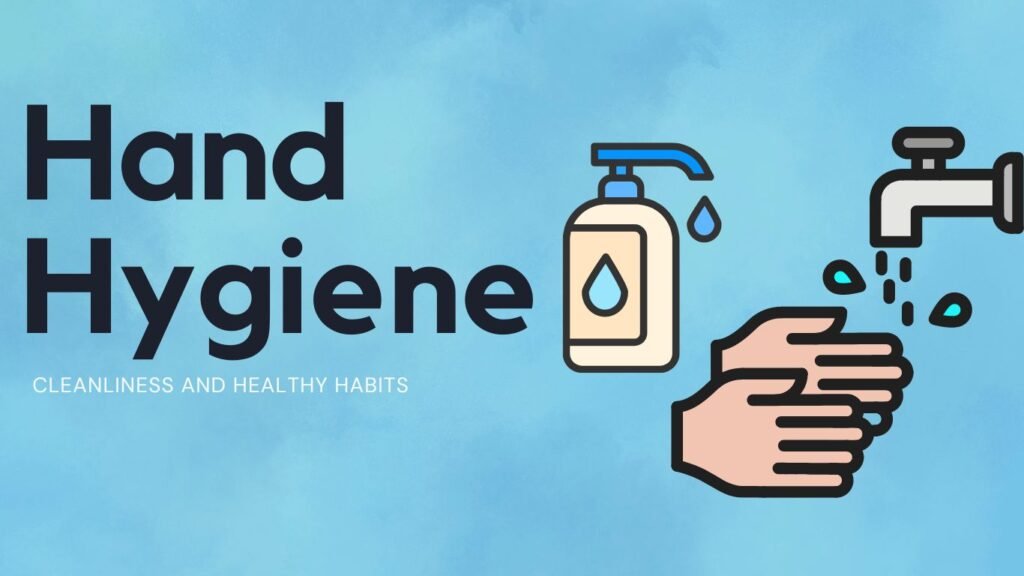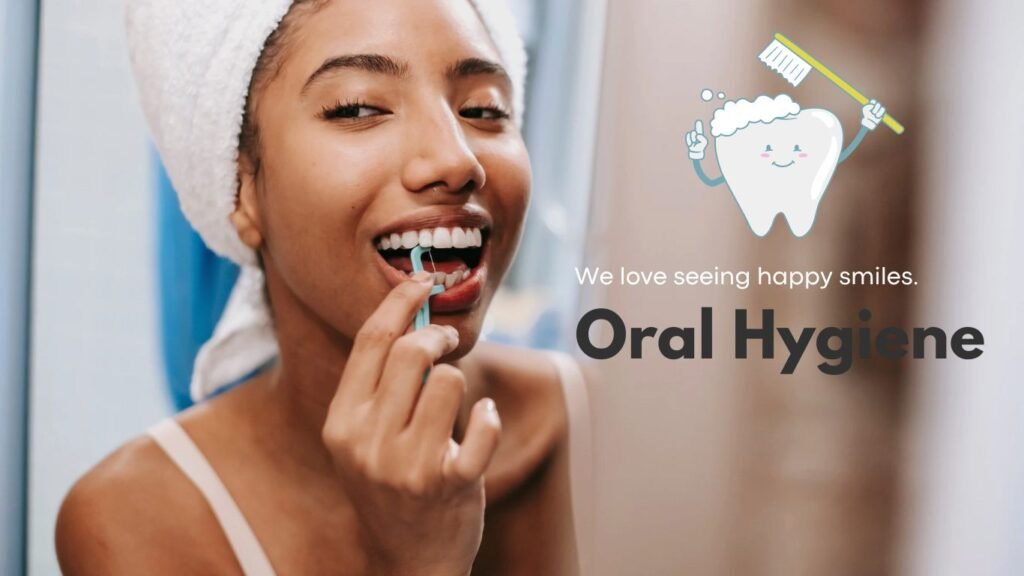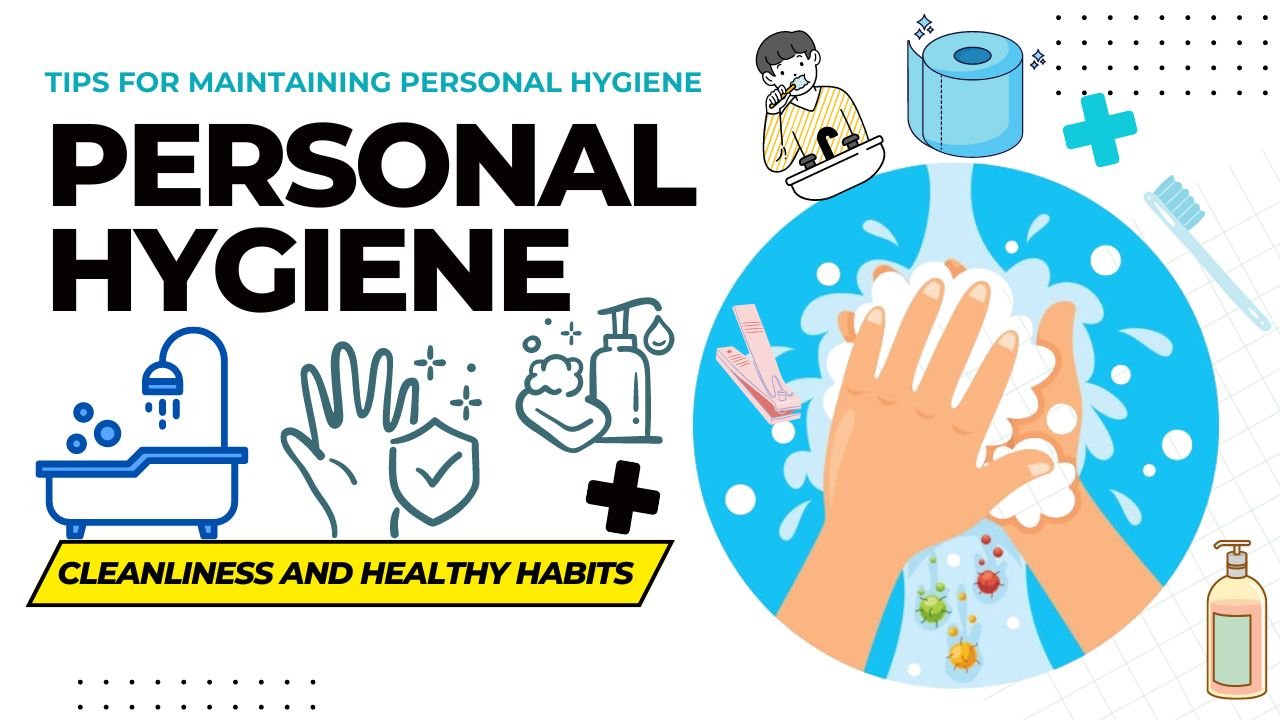Introduction
Personal cleanliness is more than simply a matter of habit in a society where first impressions count greatly—it’s a sign of our respect for both ourselves and other people. Imagine entering a meeting with a sense of freshness and confidence, knowing that you are performing at your peak. Keeping oneself clean is essential to releasing that emotion. It’s about adopting a lifestyle that improves your general well-being, raises your self-esteem, and has a positive influence on others around you, not only about avoiding disease. Now let’s explore the fundamentals of personal hygiene and learn how you can make little adjustments that have a big impact.
Cleanliness and healthy habits:-
1. Hand Hygiene
Your hands are a major source of infection since they come into regular contact with people, things, and surfaces. It’s essential to practice good hand hygiene to stop the transmission of illnesses. This is the proper way to accomplish it:
Hand wash: Work on all areas of your hands for at least 20 seconds, using soap and water. The spaces between your fingers and under your nails require extra care.
In the event that soap and water are unavailable, apply hand sanitizer that contains at least 60% alcohol.
Steer out of your face: This reduces the amount of germs that go from your hands into your mouth, nose, and eyes.

2. Oral Hygiene
In addition to giving you more self-assurance, a bright grin also suggests excellent health. Gum disease, tooth decay, and foul breath are all consequences of poor oral hygiene. Sustain your dental health by:
Brushing should be done twice a day, for at least two minutes each time, using fluoride toothpaste. Using mouthwash after every meal, especially after ingesting sweets, is healthy for your teeth and gums.
Daily flossing: This gets rid of food residue and plaque in spaces between teeth that a toothbrush is unable to reach.
Frequent visits to the dentist: at least twice a year, schedule a professional cleaning and examination with your dentist.

3. Body Hygiene
Showering frequently can help you clean your body of perspiration, grime, and oils. Use mild soap and lukewarm water.
Applying deodorant: This reduces the stench that results from perspiration being broken down by bacteria.
Wearing clean clothing: To avoid odor and skin irritation, change your clothes every day, especially your underwear. Handkerchiefs and underwear need to be properly and regularly washed.
4. Hair Care
Oils and debris can get trapped in your hair, which can harm the condition of your scalp and look bad overall. Keep your hair looking good by:
Frequent washing: To maintain your hair manageable and clean, use a good shampoo and conditioner.
Scalp care: Gently massage your scalp to enhance blood flow and lessen dandruff.
Trimming: By reducing breakage and split ends, routine haircuts support the health of your hair.
5. Nail Care
Neglected nails can harbor dirt and germs, leading to infections. Keep your nails clean and trimmed by:
Regular trimming: To maintain your nails neat and short, use clean nail clippers.
Cleaning underneath: To stop bacterial growth, clear the area beneath your nails of dirt and debris.
Moisturizing: To keep your hands and cuticles from becoming dry and cracked, use lotion.
6. Foot Hygiene
Because of their propensity to perspire, your feet can harbor germs and fungus. Among the things that constitute good foot hygiene are:
Washing your feet every day: Give your toes special care and give them a thorough cleaning.
Drying well: To avoid fungal infections, make sure your feet are totally dry before putting on socks and shoes.
Wearing breathable footwear: Make sure your socks and shoes are made of materials that let air circulate around your feet.
7. Other hygiene
Taking care of your eyes is essential to hygiene. Regularly washing your eyes with clean water twice or three times a day will help avoid infections.
Even among family members, never share towels.
Since your ears are a vital component of your body, you should clean them correctly and on a frequent basis. Soft swabs should be used to clean the wax that has developed in the ear. Avoid inserting any sharp things into your ears as this might harm your eardrum.
Rest and Sleep:-
When we consider personal hygiene, we frequently consider actions like taking a shower, brushing our teeth, and washing our hands. But relaxation and sleep are just as important for maintaining general hygiene and wellness. Sufficient sleep and relaxation are essential for maintaining good physical and mental health, as well as general functioning. Rest and sleep are essential components of personal hygiene, impacting many facets of our everyday life and well-being. Prioritizing excellent sleep hygiene and making it a priority can help you maintain the physical and mental health of your body as well as your general quality of life. Recall that getting enough sleep is a need, not a luxury. Accept the value of sleep, and you’ll discover that you’re healthier, more energized, and prepared to take on each day with enthusiasm.
Physical exercise:-
Personal hygiene is a broad term that includes a variety of actions used to keep oneself clean, fend off disease, and enhance one’s general health. Exercise is just as important to personal hygiene as the more conventional practices of hand washing and tooth brushing. Frequent physical activity promotes a healthy lifestyle, improves brain and immune system performance, and supports biological functioning. Exercise is crucial since it strengthens the immune system, promotes good behaviors, and improves mental and physical health, particularly cardiovascular health.
Types of Physical Exercise
1. Exercise using Aerobics
Walking, running, riding, swimming, and dancing are a few examples.
Advantages: enhance cardiovascular health, increase stamina, and encourage weight reduction.
2. Bodyweight activities: (such as push-ups and squats) and resistance band exercises are examples of strength training.
Benefits: Increases metabolism, fortifies bones, and increases muscular mass
3. Exercises for Flexibility
Examples: Pilates, yoga, and stretches; Benefits: enhances balance, coordination, and flexibility while lowering the chance of injury
4. Strength Training
Running, rowing, and high-intensity interval training (HIIT) are among the examples.
Benefits: improves respiratory and cardiovascular efficiency and increases stamina.
The Importance of Personal Hygiene
1. Prevents Disease
Poor hygiene is a major factor in the transmission of many infectious illnesses, including the flu, colds, and gastrointestinal problems. You can lessen your chance of getting sick and transmitting these diseases by keeping yourself clean.
2. Promotes Mental Wellness
Maintaining good hygiene has a big influence on mental health. Having a clean and fresh feeling gives you more confidence and self-esteem, which enables you to approach the world with a positive outlook.
3. Encourages Acceptance in Society
Your personal hygiene has an impact on how people see and relate to you. Relationship problems and social isolation can result from poor hygiene. Maintaining a decent appearance encourages acceptance and favorable social connections.
4. Encourages Physical Well-Being
Maintaining good oral hygiene, taking frequent baths, and dressing in clean clothes are examples of hygiene behaviors that support the health of your skin, teeth, and entire body. By doing this, problems like body odor, dental decay, and skin infections are avoided.
Tips for Maintaining Personal Hygiene
It’s not difficult to incorporate excellent hygiene into your regular routine. Here are a few useful pointers:
Make a note of it: To help you remember to practice good hygiene, such as washing your hands and brushing your teeth, set alarms or use apps.
Maintain sanitary supplies close at hand: Keep supplies like tissues, hand sanitizer, and a portable toothbrush in your backpack for when you’re on the run.
Make it fun by: To ensure a good experience, select hygiene products with smells and textures you appreciate.
Maintain consistency: To guarantee that good hygiene habits form, make them an indisputable part of your everyday schedule.
Maintaining good personal cleanliness not only saves your health but also boosts your self-esteem and social relationships. You may make an investment in your general well-being and present a nice image to the outside world by practicing proper hygiene. Recall that even little actions like routine hand cleaning, tooth brushing and flossing, and maintaining clean clothes and body may have a significant impact. Accept the power of cleanliness and allow it to improve your life. After all, you can handle any issue with poise and confidence when you feel good about yourself.
In Conclusion
Facebook
Twitter
LinkedIn
Telegram
WhatsApp



